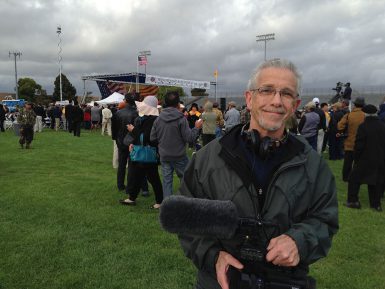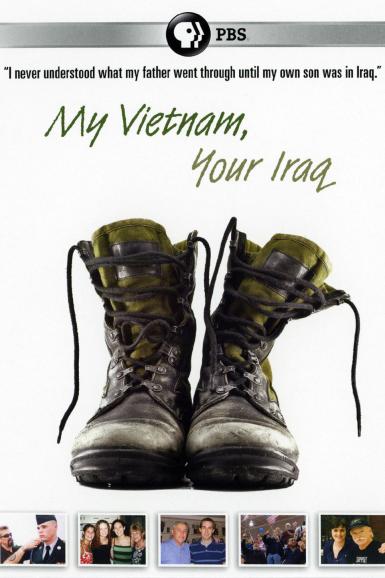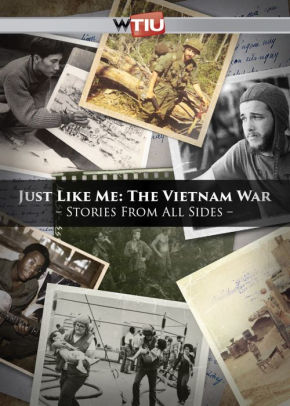The veterans’ storyteller
Thirty-three years after he returned from service in Vietnam, Media School professor emeritus Ron Osgood felt proud to be a veteran for the first time.
It was 2005, and he had returned to his hometown of Chicago for the dedication of a Vietnam veterans memorial.

“There were hundreds of people, many of which were Vietnam veterans wearing a cap that said, ‘Vietnam veteran’ or a shirt that said ‘First Cavalry,’ or something to represent themselves as a veteran,” Osgood said. “There were so many veterans, and I saw how proud they were.”
Simultaneously, decades-old anti-war group Vietnam Veterans Against the War was supporting an Iraq War protest. The juxtaposition of the two events piqued Osgood’s interest.
At the protest, he heard impassioned speeches by two young men, both still on active duty. Afterward, he approached one of them and acknowledged his “courageous” speech. The man told him his father, a Vietnam-era veteran who supported the Iraq War, had all but disowned him for his opposition.
“I left and drove back to Bloomington with this emotion of feeling proud to be a veteran and sad that this young man who would soon be a veteran spoke out with his beliefs, and his father would not accept him,” Osgood said.
That, to Osgood, emphasized the generational aspect of the Vietnam and Iraq wars and inspired his first war documentary, My Vietnam, Your Iraq.
“That became the catalyst for my next 13 years of work with veterans’ projects,” he said.
Osgood is a veteran and a veterans’ storyteller, though the stories he tells are rarely his own. Rather, they’re the experiences and memories of countless other veterans he’s spoken with throughout the production of two documentaries: My Vietnam, Your Iraq and Just Like Me: The Vietnam War — Stories from All Sides, and a sprawling online multimedia project he’s developing called Vietnam War Stories.
Two generations, two wars

My Vietnam, Your Iraq premiered on PBS in 2011 after making the rounds at film festivals for three years. The documentary tells the stories of Vietnam veterans and their children who served in Iraq.
“There was that connection of what it’s like to be in this family lineage where you have a parent and at least one of their children that’s served,” he said.
Osgood felt a personal connection to the film. As a veteran and a father, he had his own anxieties about his son, who had no interest in the military, being drafted.
Osgood said his veteran documentary projects don’t push any political agendas. But that didn’t free My Vietnam, Your Iraq from controversy.
When he submitted the film to a festival aimed specifically at veterans, the organizers asked him to edit it to remove a story about a veteran who became an anti-war activist after her time in Iraq. After some consideration, he opted to leave the original film intact at the risk of being denied by the festival.
The festival screened the film anyway.
Most of the audience’s questions in the post-film Q&A session were about her story, and he stands by his inclusion of her story.
“I didn’t want that one to be political, but yet it became political based on the people whose stories I chose and the way that I had edited them in the documentary,” he said. “I don’t believe it’s an anti-war film, but questions war from the point of view from those who served.”
He said his intent is always to tell the stories of subjects, and to let their words give the film substance and shape.
While working on My Vietnam, Your Iraq, Osgood spoke to a veteran named Arthur. After a particularly vicious firefight, Arthur’s unit found a half-written letter among the personal effects of a dead Vietnamese soldier. Arthur told Osgood that the letter was similar to one of his own, complaining about food and weather, and making small talk.
But Arthur’s letter made it home. The Vietnamese soldier’s did not.
“He was just like me,” he told Osgood.

Just like me
That idea — and that specific phrase — inspired Osgood’s next veteran documentary, Just Like Me: The Vietnam War — Stories from All Sides. The film takes an objective look at the experiences of veterans on all sides of the war, avoiding specific political agendas in favor of simply letting stories speak for themselves.
The documentary, which aired on WTIU in September 2017, incorporates stories told by North Vietnamese, South Vietnamese and U.S. soldiers, refugees and civilians.
Osgood said nearly all the veterans were reflective of their experiences. Many had suffered from trauma since serving, and a few struggled to tell their stories.
“Most veterans were proud they served when called upon, but some of them felt it was a waste to fight this war,” he said. “Some of those who were in actual combat are still haunted by the experience and did not want to talk about it.”
Osgood won a regional Emmy in the Documentary – Topical category, awarded by the Lower Great Lakes Chapter of the National Academy of Television Arts and Sciences.
He said he plans to take the film to universities and give talks on it, and possibly bring it to film festivals.
“I think the outreach work extends beyond having a documentary or having a website,” Osgood said. “It’s trying to engage audiences, especially veterans, into telling their stories.”
A living documentary
Stories from All Sides isn’t contained to one feature-length documentary film. It’s a sprawling feat of transmedia storytelling that includes what Osgood calls “a participatory website.”
The still-under-construction website, Vietnam War Stories, operates as a free-form documentary, presenting visitors with an ever-growing collection of interviews sorted by topics.
Users can compile playlists based on searches and easily find content on topics ranging from B-52 bombers to Agent Orange, getting drafted and returning home. Users can reorder the videos into a miniature documentary.
The website hosts clips from about 150 interviews, and Osgood said he plans to keep expanding it.
“It’s really a pretty small database when you consider the number of veterans that are still alive,” he said.
The idea for the website came from Osgood’s work on his two previous documentaries, but it was spurred into fruition in 2010 when he applied for an Institute for Digital Arts and Humanities fellowship program for innovative technology projects. An IU New Frontiers Grant provided the project’s initial funding, including the development of a prototype website.
The next step was to launch the project beyond the limited scope of what he could achieve on his own. To do this, he pursued a National Endowment for the Humanities grant.
When his first NEH grant application was rejected, Osgood said he considered stepping away from the project. But positive feedback and offers of help from other scholars prompted him to try again.
When his second application was rejected, he and his collaborators chose a new path. They applied for – and received – two internal IU grants, the first to revamp the website, and the second to host a symposium that would shape further developments on the project.
The symposium was July 23-24 at IU. Osgood invited scholars from around the country to bring new ideas to the public, as well as to investigate how historical materials can be used and contributed to by scholars and the general public.
“The symposium was well-received, as speakers and attendees were engaged and shared information,” he said. “The outcome provided a list of suggestions, some supporting the direction the project is heading and others I had not thought about. “
Osgood said his most substantial goal for the website is to add a means of accepting story submissions from veterans worldwide.
But that concept also poses hardships.
“There’s challenges technically and as far as credibility of the stories,” he said. “Veterans’ stories are always stories that people – other veterans especially – are skeptical of.”
Osgood said memory, among other things, can cloud or obfuscate the truth in some cases. In others, veterans will present stories as their own without realizing they’d merely been pieced together from snippets of other stories they’d heard. Some, though rare, fabricate stories entirely.
But he said simple fact-checking is a first step and reliable fallback.
Osgood said he also plans to create an interactive map to geographically pinpoint the locations of veterans’ stories. By creating pins based on stories, Osgood said he hopes to not only add another contextual level to the website, but also to offer veterans an opportunity to connect with one another and get a better sense of the context of their own experiences.
Preservation
Osgood’s work is all about preserving stories in their pure form.
He asks objective questions to prompt the stories, rather than leading ones, and structures his documentaries around the experiences his subjects share rather than any other focal point or agenda.
“The whole thing for me then kind of boils down to needing to figure out ways to capture stories from veterans before those stories are no longer available,” he said, citing World War II as an example of a vanishing generation of stories, because veterans are dying without having shared them.
Early in his work, Osgood found many people he spoke to were more open and trusting with him because he was a veteran. They talked for hours. They shared stories their wives later said they’d never told before. He said some of his early interviews lasted upward of two hours, with only a dozen or even fewer questions asked.
“As soon as I started doing the first round of interviews, I realized that there was a trust in me, because I was a veteran, for people to be able to express their stories,” he said. “Their stories would continue without me having to ask questions.”
But talking about such heavy topics has taken a toll on Osgood. While working on My Vietnam, Your Iraq, he often watched the nightly news and teared up at stories of American soldiers killed overseas, he said.
“My wife, for one, told me ‘You need to stop doing this work, because it’s making a mess out of you,’” he said. “I got pretty emotionally involved in it, but I still felt it was important to tell those stories.”
The value of those stories is Osgood’s driving force. Less important, he said, is whether or not a documentary ever comes of his interviews.
“The most important part of my work with veterans is allowing them to tell their stories,” Osgood said.

